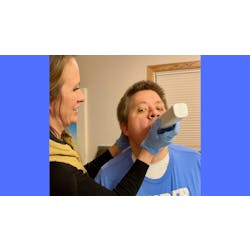DIANNE GLASSCOE WATTERSON
Dear Dianne,
I recently had a man in my chair who is a heavy smoker. He had lots of leukoplakia and his teeth were quite stained. I had never seen this patient before, so as I worked I talked about the dangers of tobacco use and oral cancer. He had not had any dental care performed for three years, and there was so much stain that I had to reschedule him to complete his care. The periodontal probing revealed a few scattered pockets as well.
Yesterday my boss called me into his office to say that this patient called him at home to complain about me. Evidently he did not like me talking about cigarettes and oral cancer. My boss was not happy and led me to believe that I could lose my job if another patient complains about me. It really hurt my feelings, and I cried in the meeting. I didn't know what to say.
I take a lot of pride in my work and strive to give all of my patients the very best I can give them. I graduated at the top of my class, and I know I'm a good and competent hygienist. But this situation has rocked me to my core. Now I'm afraid to say anything, and I fight tears every day at work.
I don't know what to do, but I'm seriously thinking about finding another job. I feel like my boss did not support me when I was trying to do the right thing. Can you help me put this into the proper perspective? On one hand, I don't want to leave my job, but I'm so hurt that I don't know if I can get over this.
Southern RDH
Dear Southern,
First of all, let me say that I feel your pain. It's never a good feeling to be chided for doing what you feel is right for the patient in your chair. However, there are several issues swirling here, so let's see if we can dissect the situation.
Since I'm from North Carolina, believe me when I say I'm well versed with smokers. My father-in-law, a former boss, and two of my aunts died from lung cancer. They were all long-time smokers. North Carolina has a long heritage in tobacco. In fact, until 2001, tobacco growing and processing was the largest source of income for the state. It's a dubious distinction.
We know that oral cancer is associated with smoking and that leukoplakia is a precancerous condition. In fact, the Oral Cancer Foundation says that close to 45,750 Americans will be diagnosed with oral or pharyngeal cancer, and 8,650 will die. Of those diagnosed, only half of them will be alive in five years.
Smoking has been associated with many systemic diseases, including periodontitis. Smoking tends to mask periodontitis, and smokers typically get about half as much resolution with either surgical or nonsurgical modalities of therapy as that of nonsmokers. Many times, I've seen 10 mm pockets at the midlingual readings of Nos. 3 and 14 in a smoker, but the tissue looked completely healthy. (The linguals of maxillary teeth are often affected more because of the concentration of heat and irritation in the maxillary arch.) In fact, the top two risk factors for periodontitis are diabetes and smoking.
We know smoking is detrimental on many levels, but the fact is that smoking is highly addictive. People love their addictions. Patients can be easily offended when we as dental professionals engage in conversation about the dangers of their addiction.
Evidently, the subject of tobacco dangers is a delicate subject with your patient, so much so that he felt the need to contact your boss directly. I'm disappointed that your boss did not support you. Doctors do not like to receive complaints about staff members, but your intentions were certainly good. Without knowing exactly what you said to set this patient off, your boss should have been less forceful when he called you in. He should have let you know that he received a phone call from a disgruntled patient, but he understood your intentions were right. That alone should have been enough to help you examine and measure what you said and possibly change/temper future communication on this topic.
That being said, we have to be careful when we talk while working. After all, the patient is a "captive" audience with little opportunity to say anything when we are engaged in delivering care. Think of how you would feel if you were in the patient's position. For example, what if you were a staunch Republican, but your new manicurist talked about what a bunch of jerks Republicans are. You'd probably be offended, and it is likely you would not want to see this person again.
Sometimes it is better to stay with the facts of what you have observed rather than disparage a patient's habit. An example would be, "Mr. Smith, during my initial assessment, I noticed some patches in your mouth. I'd like to show you what I'm talking about." Then take a mirror or an intraoral camera and show the patient, then continue. "These patches are known as leukoplakia, and every pathology textbook says they are precancerous. They are common in smokers." All you've done at this point is point out what you've seen. You have not said one negative thing about his habit. Then you should say, "If you should ever decide to quit smoking, we are here to support you in any way we can." Then, I would discreetly give the patient a brochure on the dangers of oral cancer and tobacco use along with his customary toothbrush. Be sure to record everything in the patient narrative.
My opinion is that it is wrong to avoid the subject of tobacco dangers, but it is also wrong to be so forceful as to offend the patient. Since this was your first time seeing this particular patient, you had not had an opportunity to build a relationship with him. First impressions do matter, and sometimes patients are more willing to listen to us after they've come to know and trust us.
Doctors should support their staff members, especially when the patient is being unreasonable. But we have to remember that all patients are not equal. Could it have been that this particular patient was a personal friend of the doctor, especially since he was so bold as to call the doctor at home? I believe that employers do not realize how their harsh words cut their employees. Some employees recover, and others respond by leaving.
This is one of those situations where you can learn from this unpleasant experience, or you can become bitter. I know you are smart if you graduated at the top of your class, so the question becomes, can you forgive your boss for taking sides with this "jerk" and not supporting you, and can you learn how to improve your own communication style when talking about touchy subjects like this? If you really like your office, you have to exercise forgiveness. Bosses make mistakes too.
All the best, RDH
Diane
DIANNE GLASSCOE WATTERSON, RDH, BS, MBA, is an awards winning speaker, author, and consultant. She has published hundreds of articles, numerous textbook chapters, an instructional video on instrument sharpening, and two books. For information about upcoming speaking engagements or products, visit her website at wattersonspeaks.com. Dianne may be contacted at (336)472-3515 or by email [email protected].




